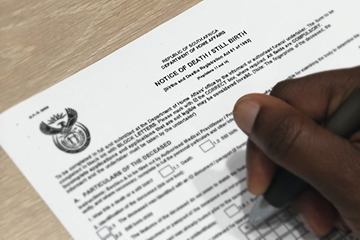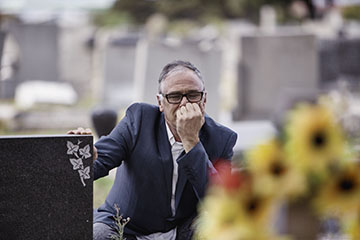Registering a Death
| Description: |
When a person dies, the family, or a person present at the death, must report the death to the Registrar of Births and Deaths. The Births and Deaths Registration Act 51 of 1992 provides an outline of the procedures that must be followed upon a death. For example, a person present at the death must contact the family doctor or hospital to get a medical certificate for the cause of death. Also, it's important to contact a funeral director to transport the deceased from the place of death (if death didn't occur at a hospital) to the nearest State Mortuary. The deceased will have to be formally identified at the mortuary before the body can be released to the funeral director. |
| Instructions: |
The Births and Deaths Registration Act requires that a person’s death be reported to any one of the following people:
Complete form BI-1663 (Notification of death/still-birth). The following people must complete different sections of this form:
The Register of Births & Death will give you a death report (form BI-1680) after the death has been registered, together with a burial order (Form BI-14). No burial may take place unless authorised by way of a burial order. The death report can be issued only by someone whom the Department of Home Affairs has authorised to do so (this includes traditional leaders, members of the SA Police Services and authorised undertakers). The Department of Home Affairs will issue a death certificate on receipt of the Notification of death and the death report together with an abridged death certificate on the same day (BI-132) of registration of death. You need to make sure that the details on the death certificate are correct, the ID number, spelling of the deceased’s names and surname and marital status. If there are mistakes on the certificate, they need to be corrected at Home Affairs. People who need to be informed
Reporting a death that occurs outside South Africa Deaths of South African citizens and South African permanent residence permit holders that occur outside South Africa must be reported to the nearest South African embassy or mission overseas. The country in which the death occurs must issue a death certificate and a certified copy of the death certificate must be submitted to the South African embassy or mission when a death is reported. If the deceased is to be buried in South Africa, the embassy or mission will assist with the paperwork and arrangements with regards to transportation of the body to South Africa. The Department of International Relations and Cooperation, together with its representatives overseas, may provide logistical assistance and advice to the next of kin in the event of the death of a South African citizen overseas. The assistance includes:
In the event the deceased had travel insurance, it's recommended that the insurer is contacted first to establish if the deceased is covered in case of death.
The South African representative will help with getting quotes to enable the next of kin to make an informed decision. For more detailed information, you can visit the Department of International Relations Cooperation's website. Home affairs will continue to register deaths during the lockdown. Offices are open to the public on Monday to Friday from 8:00 to 15:30, and from 9:00 to 15:30 on the last Wednesday of the month. Please remember that, according to COVID-19 regulations, a person must wear a face mask when visiting Home Affairs offices. |

 Reporting and registering a death
Reporting and registering a death The next of kin of a deceased South African has 4 options to consider:
The next of kin of a deceased South African has 4 options to consider:
